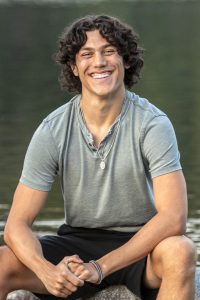Marine Biology student, Jaycee Williford, receives the Kurt Grinnell Aquaculture Scholarship

Finishing up his second quarter at the University of Washington – studying Marine Biology and American Indian Studies (AIS) – is Jaycee Williford. He recently received the Kurt Grinnell Aquaculture Scholarship, which is awarded to Indigenous people interested in pursuing educational opportunities in aquaculture, fisheries science and management or natural resource management.
For Jaycee, his interest in the pursuing an environment-related science at university was solidified during his last year of high school. “I attended high school in Sammamish, and knew I wanted to study environmental science or marine biology depending on where I got into school. When I was accepted to UW, I knew the Marine Biology degree was something I really wanted to do.”
Jaycee’s passion for tribal fisheries really took off in his first couple of months on campus. “I knew there were lots of Tribes in this region and a lot of them ran their salmon fisheries, but being from Sammamish, I was only familiar with the Issaquah hatchery, “Jaycee said. “I am Native American, and when I started at UW, I was talking to a lot of other Tribal people through club meetings and things like that and started reading more about tribal fisheries. Hearing about things like the success in Kokanee restoration on Lake Sammamish this past year inspired me even more and I felt like I was on the right path in focusing on Tribal fisheries as my future career path.”
The Kurt Grinnell Aquaculture Scholarship was formed in honor of the late Kurt Grinnell, a Native American leader deeply involved in Washington State’s aquaculture. For Jaycee, he found out about the scholarship in a meeting with one of the UW Marine Biology advisers, Joe Kobayashi. “You have to be a Tribal member pursuing a degree to benefit aquaculture to receive this scholarship, and it’s aimed at continuing the instrumental work of Kurt Grinnell,” Jaycee shared. “I’m still at the very start of my undergraduate journey, but I know I want to do something with tribal fisheries and aquaculture — maybe endangered species or salmon — and maybe even with the Chickasaw Tribe in Oklahoma, of which I am an enrolled member”. The Chickasaw Nation is a federally recognized Indigenous Nation, located in south-central Oklahoma.
The application for the Kurt Grinnell Aquaculture Scholarship involved submitting short essays, financial requirements, and two references. “I applied in winter and was awarded for the rest of this year, but I can also apply next year. The networking opportunities are a really fantastic benefit of the scholarship so far, with the chance to meet and connect with the community involved in aquaculture and fisheries all over the US. I’m excited to get more hands on and make more connections as time goes on,” Jaycee said.
Something Jaycee would like to share with others is how many resources there are available to students. “Talk to your advisors – they’re so knowledgeable about the various opportunities out there such as scholarships, and what ones are relevant for different students,” Jaycee said. “Talking with my fellow Native community on campus has shed so much insight too, especially into opportunities that would be applicable for me. But essentially: talk to everyone who could know more, and at some point, you’ll find the information you need.”